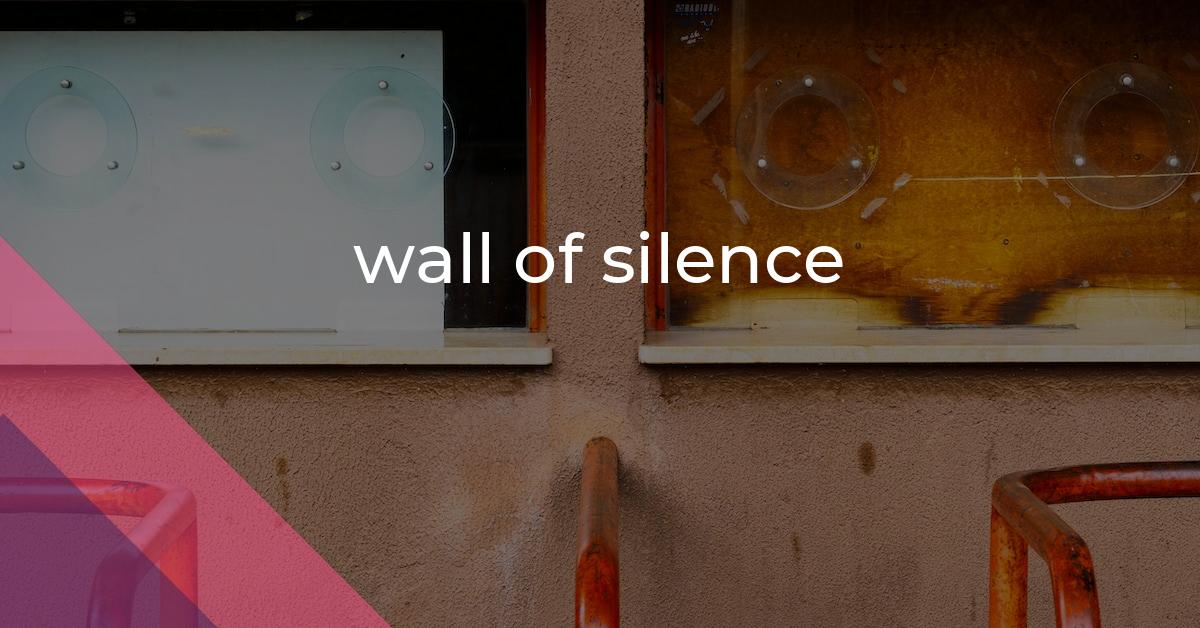wall of silence: Idiom Meaning and Origin
What does ‘wall of silence’ mean?
A "wall of silence" is an expression used to describe a situation where people refuse to speak or give information about something, usually to protect someone or hide a wrongdoing.

Idiom Explorer
The idiom "tight lips" means to keep a secret or to not reveal information. It suggests that someone is keeping their mouth closed and withholding any details or thoughts.
The idiom "tight-lipped" means to refuse to speak or to keep quiet about something. It implies a sense of secrecy or unwillingness to reveal information.
The idiom "talk to a brick wall" means to speak to someone who is unresponsive or unwilling to listen or understand what you are saying.
The idiom "stonewall" means to refuse to answer or cooperate, often by deliberately withholding information or obstructing progress.
The idiom *silent treatment* refers to the act of deliberately ignoring or refusing to speak to someone as a form of punishment or disapproval. It is often used as a means of expressing anger, resentment, or asserting control in a relationship or conflict.
The idiom "shut one's mouth" means to stop talking or to keep quiet, usually in response to a command or to avoid saying something inappropriate or offensive.
The idiom "shut my mouth" means to remain silent or refrain from speaking, typically to prevent oneself from revealing a secret, expressing an opinion, or getting into trouble.
"Put up or shut up" is an idiom that means to either take action or remain quiet about a challenge or boast you have made. It implies that if you cannot back up your words with action, then it is better to say nothing at all.
The idiom "pact of silence" refers to an agreement among a group of people to not disclose information or keep a secret, typically used in legal or illicit contexts.
When someone does something "on the hush," they are doing it secretly or without others knowing. It refers to keeping something quiet or confidential, often to avoid getting in trouble or causing a disturbance.
Deafening Secrets
The idiom "wall of silence" is a figurative expression used to describe a situation where people refuse to speak or provide information about a particular topic or event. It suggests a deliberate withholding of information or a collective agreement to keep quiet. This idiom is commonly used in the United States and can be found in various contexts, such as legal proceedings, criminal investigations, and organizational culture.
One interesting fact about the idiom "wall of silence" is that it originated from the metaphorical concept of a physical wall that obstructs or prevents the passage of sound or information. This metaphorical usage can be traced back to the early 20th century, where it was employed to describe situations where a group of people deliberately refrained from speaking or providing information.
In the legal context, the idiom "wall of silence" is often associated with witness intimidation or a code of silence among criminals. It signifies a concerted effort by individuals involved in illegal activities to remain silent and ensure that the truth is not revealed. This idiom has been used in news coverage and court cases to describe situations where individuals refuse to cooperate, making it challenging for law enforcement to gather evidence and solve crimes.
One related idiom is the "blue wall of silence," which refers to the code of silence among police officers, where they refuse to testify against their colleagues. This pact of silence can hinder investigations and prevent the truth from coming to light. It is important to note, however, that not all police officers subscribe to this code, and there are many who prioritize transparency and accountability.
The idiom "wall of silence" is not limited to criminal cases and can also apply to other settings, such as organizations or communities. In these contexts, it can refer to a cultural dynamic where individuals within a group choose not to speak out against wrongdoing, either out of fear, loyalty, or a desire to protect the reputation of the group. This can lead to a perpetuation of harmful behaviors or the cover-up of misconduct.
Another related idiom is the "pact of silence," which suggests an agreement among a group of people to keep quiet about a particular matter. This pact can be driven by various factors, such as fear of consequences or a shared understanding of the importance of maintaining secrecy. The existence of a pact of silence can make it challenging to uncover the truth and hold individuals accountable.
It is worth noting that the idiom "wall of silence" is often used in a negative context, highlighting the potential harm caused by secrecy and lack of transparency. However, it can also be interpreted as a means of self-preservation in certain situations, such as refraining from speaking out in a repressive regime or protecting oneself from unjust consequences.
Another related idiom is to "keep quiet," which is a straightforward expression that means to remain silent or not speak out. This idiom can be used in various contexts, such as advising someone to withhold information or urging them to refrain from sharing their thoughts or opinions. It aligns with the concept of the "wall of silence," illustrating the notion of deliberate silence and the withholding of information.
Overall, the idiom "wall of silence" encapsulates the notion of deliberate silence, collective agreement, and the withholding of information. It has origins in the metaphorical representation of a physical wall that prevents the transmission of sound. The idiom finds common usage in legal proceedings, criminal investigations, and discussions around organizational culture. While it carries a negative connotation, it also acknowledges the complexities and potential benefits of remaining silent in certain circumstances. The idiom "wall of silence" serves as a reminder of the power dynamics, societal pressures, and ethical considerations surrounding the act of withholding information.
Example usage
Examples of how the idiom wall of silence can be used in a sentence:
- The detective faced a wall of silence as none of the witnesses were willing to speak about what happened at the crime scene.
- During the interrogation, the suspect maintained a wall of silence and refused to answer any questions from the police.
- After the scandal broke out, the company employees created a wall of silence, avoiding any discussions or comments about the situation.
More "Communication" idioms



